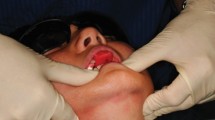Key Points
-
Some folk wisdom and customs have been superseded by modern dental care.
-
There remain some deficiencies in public information and product provision.
-
Two suggestions are offered.
Abstract
This memoir reviews a patient's lifetime contact with dentists. Over the years approximately 1935-2003, parents, society and dentists in different parts of the UK afforded a variety of care and treatment. Here is the experience of one patient.
Similar content being viewed by others
Main

The survivors remaining are rooted in my gums, though many have been crowned by my dentist. I do not have a plate and I am glad of that. For a child there was grotesque horror in the sight of an older person's false teeth in a glass. Some of my contemporaries 'got their teeth' for their twenty-first birthday.
This was a blessed relief from a lifetime of problems from infant teething onwards. Babies cried a lot and were given rusks to bite on. Toothache was common, a terrible experience. Everybody suffered a 'gumboil' at some time, with painful swelling and reddening of the face. I seem to remember that even such mythical characters as 'Desperate Dan' and 'Korky the cat' would appear in this condition. Oil of cloves was the standard remedy, sometimes on a cottonwool pad held against the tooth. Later an aspirin tablet might be held against the tooth. An obstinate loose tooth really would be tied to a door handle. A firm slamming of the door brought the tooth right out. The reward, if the tooth was hidden under the pillow, was a shiny silver threepenny bit left by the fairies who built their castle with children's teeth.
I grew up in a soft water area. Sweets were strictly in the power of adults, not for the sake of children's teeth. 'Sweeties' were used for comfort and reward, and for a pleasant send off into sleep. A cough or sore throat keeping a child awake would be soothed by a little ball of butter rolled in sugar. Once asleep, the child would grind her teeth after every cough — cause for complaint by older sister in the same bed. On the very day of a strong paternal lecture on the evils of chewing gum, our visiting family doctor arrived, himself chewing, and offering us children a piece each! With a guilty glance at the parents we accepted.
At age seven I had seven teeth removed 'for overcrowding'. This was done under gas, and I recall walking in circles, crying and clinging on to my mother who took me to buy romantic pink and violet cachous on the way home. At age ten, in wartime evacuation, I shook so much in the chair while waiting for an injection to 'take', that the strange dentist interrupted his animated conversation with my mother, seized my knee, and said 'Stop shaking, woman!' But even this mode of address couldn't stop me shaking. From later experience, I think it may have been partly due to the actual chemical used.
At age eleven-twelve, I had my first conscious awareness of the separation of mind from body. In the silence of the night time house, I awoke having sleepwalked downstairs, to the reflection on the polished piano of dying embers glowing in the fireplace. Raging toothache possessed me and I hurried back upstairs in the dark. Back in bed, in extreme pain, I found I could co-exist as my usual self with the, quite separate, toothache. The trick was to maintain this separation, and I managed that sufficiently well to get back to sleep.
Cleaning our teeth in those years was more a moral obligation than a health measure. A vigorous horizontal scrubbing of the front upper teeth with 'milk of magnesia' tooth paste to secure a well-brought-up smile. This was so important that when it didn't work properly my mother actually attacked my sister's front teeth with Vim (scouring powder)! Back pains at age nineteen caused my doctor to send me to a dentist in case some 'focus of infection' was the cause. Sure enough the dentist found a tooth which on extraction proved to be 'honeycombed with decay'. (The back ache was later explained by something completely different.) Then from the radio came the surprising command not to scrub hard, for fear of wearing away the teeth, and to brush vertically. Later, in agony one New Year's Day in London, I found a Scottish dentist from the same region as myself. He recoiled in horror saying, 'This could have been my mouth!' The strange thing is that my brother, reared on the same diet and in the same environment as I, required his first filling only at the age of 23!
I 'lost a tooth for every child' as expected, and had the fear of death put in me in 1960 by a young dentist who threatened to send me to Guy's hospital for the extraction of a wisdom tooth. Fortunately we were just about to move to London where we found a neighbour whose brass plate announced him as a German dentist. He laughed scornfully at the story of the young English dentist's cowardice. He had been required to retrain completely before being allowed to practise in this country. He retained German habits of courtesy and ceremony. One was in the presence of a master who actually explained to the mouth-wide patient what he was doing. He was meticulous in telling us, while filling cavities, when he was about to perform 'ze undercut'.
'The trouble is, Mrs Sinclair, that you have a very small mouth.' I knew that I did not have the cavernous oral cavity of my song-bird sister, but no-one had ever remarked on it before. Nevertheless, he injected me, explaining as he walked around the chair, why he was applying the injection in several different places. As we waited, he talked of holidays at Broadstairs and about his wife. She was a harpsichordist, and was translating a book by Frederick the Great, of instruction in playing the flute. He patiently extracted my wisdom tooth and sent me home within half an hour with a reserve dose of aspirin.
By this time I had heard of flossing, but regarded it as a weird custom. Nevertheless I occasionally used a hair or cotton thread to release a wedged crumb from between teeth. We had all used fancy mouthwashes in our teens, as well as Gordon Moore's cosmetic toothpaste. This claimed to make the gums look redder so that the teeth looked whiter in contrast. Differently shaped toothbrushes were supposed to make a difference, for example 'the Wisdom Mouthbrush'.
What is noticeable is the absence of really good information and instruction in oral hygiene. Then came the hygienist: a wonderful new auxiliary in an excellent, modern team of dentists who really made a difference. It took some time to realise that her role was skilled and important, but at last, with her help and feedback from my dentist, over years I have evolved a routine. It has its ludicrous aspect, but seems to work pretty well for my age and stage.
I cannot now bend over a wash basin to clean my teeth. So I sit upright at a table with a tray in front of me. The tray contains: a glass of water; a toothmug with a dose of mouthwash, neat; a spittoon — usually the current empty 500 gm yoghurt pot; flossing tape, the one currently under trial; a tube of fluoride toothpaste; today's toothbrush, one of four in different shapes and sizes used in rotation; an interdens tiny brush; and a stick of sugar-free chewing gum.

I tuck a towel into my clothes at the neck to catch splashes. And then with good music or TV flowing, I start. Floss to remove bits. Tiny, single tuft brush dipped in mouthwash around the gums and between the teeth, and especially into every corner around the back teeth. Brush with today's brush and fluoride paste: gently, carefully, and in all directions. Rinse with water, spit. Rinse and flush between teeth with mouthwash slightly diluted. When feeling courageous, gargle with mouthwash. Pop gum in mouth to take away taste of mouthwash and stimulate salivation. Then mop up. All this once a day is enough. Ridiculous isn't it? But it's only practice, organised. And I have still two problems not dealt with.
First, from magazines and TV we know all about hearts and childbirth and colons. But we have never had a good informative series about The Mouth, Gateway to the Body: its bony structure; the soft tissues; the gums; evolution of teeth; dentition: first and second; flora and fauna of the mouth; chemistry and functions of saliva; connections with neighbouring organs — tonsils, nasal cavity etc. And kissing. We don't know all this and yet we are expected to keep it all clean!
And secondly, mouthwashes. Do they have to be so nasty? To set out on a new day with the mouth smarting — like the bottom of a Victorian child thrashed daily whether he deserved it or not — may perhaps produce a feeling of virtue. Similarly with toothpastes: the supermarket array of mint, supermint, extra mint, extreme mint etc. offers nothing but pain to some of us. Same with sugar-free chewing gum. And the special dental chewing gums are even worse. Gone are the Citrus and the spicy Dentine, replaced by ever more vicious minting. Are there no aromatic herbs but mint? How about rosemary, or aniseed, or sage? Please listen, innovative pharmaceuticals, and look after us kindly.
Acknowledgements
Grateful acknowledgement to Peterborough's Cathedral Square Dental Practice, particularly Neil Thorburn MSc BDS MGDS RGS(Ed) and Jacqui Bearley DipHE DHE.
Author information
Authors and Affiliations
Additional information
Refereed Paper
Rights and permissions
About this article
Cite this article
Sinclair, I. Seventy years with my teeth. Br Dent J 195, 573–574 (2003). https://doi.org/10.1038/sj.bdj.4810726
Received:
Accepted:
Published:
Issue Date:
DOI: https://doi.org/10.1038/sj.bdj.4810726



